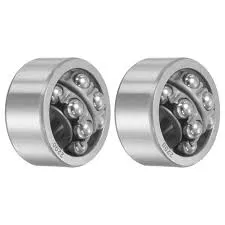
Dec . 12, 2024 09:52 Back to list
industrial machine bearings
Understanding Industrial Machine Bearings Essential Components for Efficiency and Longevity
Industrial machine bearings play a vital role in the smooth operation and longevity of machinery in various sectors, including manufacturing, construction, and transportation. These components reduce friction between moving parts, support loads, and contribute to the overall efficiency of machines. As machines become more complex and the demand for precision and reliability increases, understanding the types and functions of bearings is essential for engineers and operators alike.
What Are Industrial Bearings?
At its core, a bearing is a machine element that allows for relative motion between two surfaces, typically involved in rotating or sliding actions. In industrial applications, bearings are crucial for supporting shafts, wheels, and other rotating parts. They help to minimize friction, thereby reducing wear and tear, and improving energy efficiency. Bearings come in various shapes and sizes, tailored for specific applications and loads.
Types of Industrial Machine Bearings
There are several types of bearings commonly used in industrial settings, each suited for different functions
1. Ball Bearings These are among the most widespread types due to their versatility. Comprising hardened steel balls placed between inner and outer rings, ball bearings can handle both radial and axial loads, making them suitable for high-speed applications.
2. Roller Bearings Unlike ball bearings, roller bearings use cylindrical rollers to support heavier loads. They are ideal for applications where high radial loads are present, such as in gearboxes and heavy machinery.
3. Thrust Bearings Designed to support axial loads, thrust bearings are critical in applications like automotive transmissions and rotary tables. They help manage the forces that act along the axis of the shaft.
4. Magnetic Bearings These use magnetic fields to support loads without physical contact, resulting in extremely low friction and wear. Magnetic bearings are increasingly popular in high-speed applications and advanced technologies.
5. Fluid Bearings Utilizing a film of liquid or gas to support the rotating shaft, fluid bearings can offer significant advantages over traditional bearings, such as reduced friction and noise. They are commonly found in turbines and high-performance machinery.
industrial machine bearings

Key Considerations When Selecting Bearings
Selecting the right bearing for an application involves considering several factors
- Load Capacity The bearing must be capable of enduring both static and dynamic loads without failure. Overloading can lead to premature wear or catastrophic failure.
- Speed Rating Bearings have specific RPM ratings beyond which they may operate inefficiently or become damaged. Understanding the speed requirements is critical when choosing bearings.
- Environmental Conditions Factors such as temperature, humidity, and exposure to contaminants can affect bearing performance. Choosing bearings with appropriate seals or lubrication types based on the operating environment is essential.
- Maintenance Requirements Some bearings require regular lubrication and maintenance, while others are designed to be maintenance-free. Understanding these needs can influence the choice based on the intended use and available resources.
The Importance of Regular Maintenance
Ensuring the longevity of industrial machine bearings hinges on regular maintenance. This involves inspecting bearings for wear and tear, ensuring proper lubrication, and monitoring for signs of overheating or misalignment. Preventative measures can significantly reduce downtime and extend the lifespan of machinery.
Conclusion
In conclusion, industrial machine bearings are crucial components that significantly influence the performance and reliability of various mechanical systems. Understanding their types, functions, and importance in machinery can lead to more informed decisions in design, selection, and maintenance. As technology advances and industries evolve, the role of bearings will continue to be a cornerstone of efficient and effective machine operation. By investing in the right bearings and maintaining them diligently, industries can enhance productivity, reduce costs, and achieve greater operational efficiency.
Latest news
-
Grooved Ball Bearing Design and Functionality
NewsJun.04,2025
-
Concrete Mixer Bearing Load Capacity Testing
NewsJun.04,2025
-
6004 Bearing Dimensions in Robotic Joint Designs
NewsJun.04,2025
-
Advantages of Single-Row Deep Groove Ball Bearings
NewsJun.04,2025
-
Applications of Deep Groove Ball Bearings in Automotive Systems
NewsJun.04,2025
-
Innovations in Bearing Pressing Machine Design
NewsJun.04,2025
